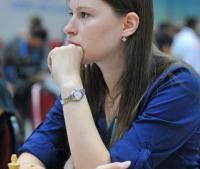
Women's World Team Chess Championship: Part I
The World Team Chess Championship is one of the most prestigious team events, although women’s championships have a very short history. This year’s edition in Mardin, Turkey was only the third. The previous two tournaments ended in the same way: 1. China 2. Russia 3. Ukraine. What about the year 2011?
Mardin is an unusual city on the south-east of Turkey close to the border of Syria. Its town center is located on a mountain.
 The weather there is warm and sunny even in December. The participants were hosted in a wonderful hotel Erdoba Elegance two minutes outside the city. Among other notable things one can mention that each evening, the restaurant was dedicated to a national cuisine of one of the teams. The first day was “Russian”.
The weather there is warm and sunny even in December. The participants were hosted in a wonderful hotel Erdoba Elegance two minutes outside the city. Among other notable things one can mention that each evening, the restaurant was dedicated to a national cuisine of one of the teams. The first day was “Russian”. 

Our team (click the link for some nice pics), the reigning Olympic and European champions, was composed of the following players: Nadezhda Kosintseva (2546), Tatiana Kosintseva (2526), Valentina Gunina (2514), Natalia Pogonina (2451), and Alexandra Kosteniuk (2439). Yuri Dokhoian stepped down as the team’s captain and was assisting the Kosintseva sisters in preparation, while Alexei Korotylev took over his duties.
Usually the main competitors for the medals are China, Russia, Ukraine and Georgia, although this year India also looked powerful enough to be in contention. Koneru Humpy (rated over 2600 at that time) had finally agreed to participate, thus greatly increasing the might of the team. Ukraine, on the contrary, was having a relatively hard time since Kateryna Lahno didn’t take part.
The tournament is held as a round robin, thus eliminating the randomness of Swiss events where top dogs sometimes don’t even get to face each other. All in all 10 teams were allowed to participate – some from the Olympiad, others as continental champions. A brief overview of the schedule for our team revealed that we were to play face three of our main competitors in the first five rounds: Vietnam, Ukraine, Greece, Georgia, China.
The first round didn’t bring any surprises for us. We defeated Vietnam with a minimal advantage (2.5-1.5). While our opponents’ ratings were not that high, we knew quite well that they have a solid team.
The central match of the round, India vs Ukraine, ended in a draw. Koneru defeated Ushenina, and Zhukova struck back against Padmini.
Other results of the 1st round: Turkey-China 1.5-2.5; RSA-Georgia 0-4; Armenia-Greece 4:0.
In the 2nd round we were challenged by Ukraine. The match was rather nerve-wracking, but in the end we won 3-1.
Let me share with you two more game fragments from that round which I found interesting. The first one is about the perils of pawn-grabbing.
Thanks to this victory, Vietnam prevailed over Greece.
And here is an example of energetic play:
This was the only win in the Georgia-Armenia match. China whitewashed RSA 4-0; India beat Turkey 3.5-0.5.
The third round was an upset for the Russian team. First our captain allowed Nadezhda Kosintseva to agree to a draw in a much better position against Dembo, and then I suffered an unexpected crushing defeat.
Valya Gunina won against Fakhiridu to level the score, and thus we only tied for a draw with Greece. Moreover, the surprises continued as Georgia lost to Vietnam 1-3, and Ukraine (average rating 2446) collapsed 1.5-2.5 against Turkey (average rating 2066)!
China pulled off a remarkable win against the solid Armenian team: 4-0. India steamrolled RSA 4-0.
After three rounds China had 6 team points out of 6, India and Russia – 5/6, Georgia and Vietnam – 4/6.
China’s performance has been most impressive so far. It was clear that all of their players were in a good shape and very motivated. But the main clashes were yet to follow, including the widely anticipated match of the giants: Russia vs China.

To be continued…



